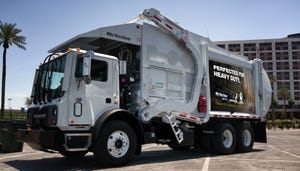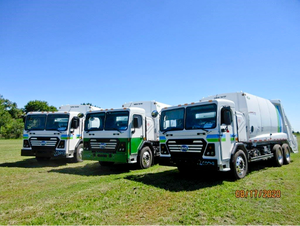A Kick In The Glass Or Potential Profit?
September 1, 1997
Cynthia Andela
As a shrewd recycling operator, you perform a cost benefit to optimize your glass processing operation, only to discover that this operation is causing your facility to sink into the red.
What to do? First, realize that your revenue for processing glass is the combined fees for accepting the material and the money from the sale of the commodity. You can maximize this income by both color sorting and pulverizing.
If glass processing is becoming a shard in your side, you should consider the following five possible solutions:
1. Don't accept glass as part of the recycling mix. This "solution" has been considered by some major waste haulers. While this will eliminate the losses associated with processing glass, it also means you must lose some of the revenue earned by accepting glass.
Glass can account for 30 percent to 50 percent of the comingled recyclables' total weight, and if you are paid perton to accept recyclables, your income will decline by those percentages.
2. Try to reduce the mixed broken glass (MBG) by better handling. This should reduce the MBG by approximately 10 percent with a marginal cost benefit if color sorting produces a positive income. However, this is only a partial solution since your disposal costs are not eliminated.
3. Automate your MBG color sorting. Such systems' costs range from $150,000 to $600,000. Their efficiency on dirty MBG is low, however, and the glass needs to be sized and relatively dry.
4. Reduce the MBG disposal costs. Look for someone to accept the MBG at a price less than the landfill fee to reduce disposal costs. This should increase daily cash flow from negative to break-even or slightly positive. Many haulers and material recovery facility (MRF) operators have opted for this solution because they don't want to process glass themselves. While this will improve the situation, it doesn't give them the full benefits of color sorting and pulverizing the glass.
However, this provides an opportunity for an independent glass processor to accept the MBG and other types of glass from the recyclers. The tipping fee for accepting the MBG glass will result in an income that can finance their processing operation. For example, Western Mobile, Bolder, Colo., charges a tipping fee for accepting waste glass from the local recycler and other commercial glass sources. Using an Andela system, it pulverizes the glass which is sold as an aggregate. Thus, it realizes income on both the front and back ends.
5. Pulverize the glass for local use or sale. This option gives a MRF both capabilities - both color sorting and pulverizing. Now, it can determine the most profitable option depending on market prices.
For a free cost benefit analysis for total (open and closed loop) glass recycling, contact the author at (315) 858-0055 or visit the Andela web site at www.recycle.net/andela
You May Also Like


